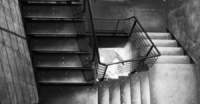 |
|
Written by Paul Landis Delaune |
Many
years ago there was a young lad who one day got
bored, so he decided to do something
he knew he shouldn’t.
His family lived in a subdivision
containing several
quadraplexes—each building consisting
of two apartments upstairs
and two downstairs. The front
of each apartment had a large,
plate-glass window. He
broke one of these big windows of an
empty, downstairs apartment.
News
of what he did spread quickly and it wasn’t long before
his mother heard about it.
When she went outside to
look for him, he hid under the
steps to his family’s
apartment and told his
best friend not to tell his mom where
he was hiding. When his mom came
down the steps and asked
where her son was, his best friend
pointed right to him.
 |
When
his mom asked him if he broke the window, he lied
and said he didn’t. When she
questioned him further, he tried
toblame his three-year-old brother
who threw a pebble that
bounced off the window.
He got in worse trouble for hiding, lying
and blaming his brother—classic
images that have been part of
our species’ defiance of authority
from our beginning and
throughout the ages. Some things
never change.
When
this young lad was punished and scolded by his parents,
they told him that he was going
to turn into a little “devil” for
being so bad. They sent
him to his room without supper and told
him to stay in bed or he would
be in worse trouble. Needless to say,
he was thoroughly upset and very
unhappy when he fell asleep
that night.
Morning
brought more grief and the young boy awoke
terror-stricken. It is
written that we must have the faith of a
child, but what happens when
the faith of a child is motivated by
fear? You see, this child of
faith, believing he was going to become
a little devil, woke up with
a hard lump on each side of his forehead.
He was growing horns! He became
very upset and it wasn’t until
his dad sat him on his lap and
shared a candy bar with him while
speaking loving words of assurance
that he calmed down.
Whenever
I tell his story, people either doubt its truth or
don’tknow what to believe. I
don’t believe it’s true—I know it’s
true. You see, I was this young
boy.
I
tell this tale from my youth to try to get people to consider
the possibility that reality
is flexible and we can alter the reality
of our experience with the power
of faith. I dare say that it is our
thoughts empowered by faith that
shapes our reality. The quality
of our thoughts determines the
quality of our reality.
Our
attitudes, beliefs and perspectives combine to form a mold
or cookie-cutter. If we don’t
like the shape of our cookies, we
choose adifferent cookie-cutter.
If we don’t like our reality, we can
choose different attitudes and
beliefs. Faith empowers confident,
loving thoughts as easily as
fearful, doubting ones. I know it isn’t
easy, for I, too, still struggle,
still waver between positive and
negative thinking. Sometimes
I’m surprised by how fearful and
blue I can become, but I remember
another way of being, seeing,
and I try hard to regain that
better way.